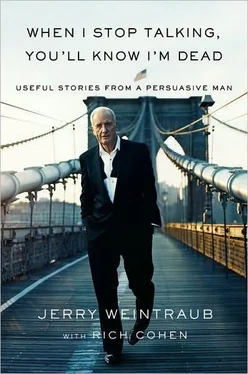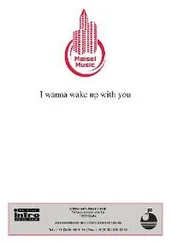In 1974, I signed a deal with ABC under which John would do five guest spots on various network shows, getting paid $2,500 an appearance. In the end, ABC only used him once, in a Chevy Special, then called and canceled the rest of the contract. In other words, they dropped him. Four weeks later, "Country Roads" hit. A few weeks after that, I signed a new deal with ABC, under which he would be paid $350,000 an appearance. Remember, when I found John, he was playing in the Village for seventy bucks a night. What happened to him, the way he blew up, was amazing.
John understood all this, and appreciated it. He paid me a fortune. There were many years in which I made ten, twelve million with John. But for me, the money was a by-product of what was a labor of love. I had many clients, some of them bigger than John-Elvis and Frank, Neil Diamond, Bob Dylan-but John and I were very close. Because I broke him, because I understood him, because he understood me, because I loved him. We started as friends but became brothers. He made me the executor of his estate, he was executor of mine. Jane and I were to take care of his children if, God forbid, anything were to happen to him and his wife, Annie.
Yet there was something troubled about John. Success and money, rather than making these things easier to deal with, often bring them to the surface. He had an overwhelming need to impress and be accepted. It probably came from his father and the fact that John never seemed to win his approval, even when he made it big. He was in search of a father, really, someone who could stand in the old man's place and say, "Yes, John, I love you. Yes." And though he wanted a father and wanted approval, he resented the fact that he wanted those things. He needed you to love him, and hated you for making him feel that need. This sowed dangerous seeds in our relationship. After all, who was I? The man in the suit who paid the bills and made the schedule. In other words, I was the father. As he became more successful, he began to resent me. He needed me, but hated me for that need. I understood this only later.
John was beloved by fans but never accepted by critics, and it drove him crazy. No matter how many records he sold, no matter how much adulation was showered on him, he needed to win and be loved by the people who had already made up their minds, who thought he was lightweight and silly. I would say, "Hey, John, who gives a crap?" Or: "You know what? Screw 'em." If you want to survive, if you want a long life and career, if you want to go wire to wire and have a decent time doing it, you need to have a deep strain of "Screw 'em." I would say, "Believe me, John, you're better with the people than with the critics. That counts if you're an actor, a producer, a politician, or a singer."
But he could not let it go. The criticism drove him wild. He was troubled, as I said. He had no identity. He didn't know what he wanted because he did not know who he was. He wanted to ditch his glasses for contact lenses. "But the glasses are part of the shtick," I told him. "The glasses are great!" I mean, if you're getting hitters out with screwballs, keep throwing the screwballs. That's the sportsman's way.
The first danger sign came in 1979, when John was on tour in Europe. I got a call from one of my assistants on the road. "John is unhappy," he said. "He's talking about firing you."
I got on a plane, went over. I stood with John outside the Inn on the Park in London. He had his head down and paced, the way he did whenever faced with an onerous task or crisis. He stammered. He said, "Look, Jerry. You know how I feel about our relationship, but I think I am going to have to let you go."
"Let me go? Why?"
"Well, it's this tour. I mean, nothing is right. The hotels stink, and the food is no good, and the venues are just awful, and the sound systems are terrible, too. The band is furious. Nothing is right."
I said, "Look, I just got off a flight from LA. Let me get some rest. Then let's talk it over in four hours."
"What's going to happen in four hours?" he asked.
"Well, maybe I can fix these problems," I said. "Think of all we've been through. You can give me four hours."
"All right," he said, "four hours, but I am deadly serious, Jerry."
"I know you are, John."
That night, we went out to dinner after his show.
I said, "Look, John. Before we eat, I want you to know I've taken care of the problem. Things will be different from here."
"You took care of them? How?"
"I fired Ferguson."
"You fired Ferguson? Who's Ferguson?"
"There has been trouble with the hotels, with the food, with the venues, with the sound systems? Well, Ferguson was in charge of all of that. He's been fired."
"Really? You fired Ferguson."
"I did. And I think you will notice the difference right away."
We started eating, talking, being brothers again. I was brooding, looking down.
"What's the matter, Jerry?"
"Well, I'll tell you, John. I'm feeling bad about Ferguson. Sure, he screwed up, but he's not a terrible guy. And now he's been fired, and he won't have his salary and he won't have his bonus and it's right before Christmas. For godsakes, John, Ferguson has a family!"
We sat in silence, eating. Finally, John threw down his napkin and said, "Darn it, I feel bad about Ferguson, too!"
Some time went by. I was eating, drinking, looking around. It was one of those stolid British restaurants, with brass on everything and waiters coming and going with pints of ale.
I said, "Look, I have an idea. Let's say, instead of firing Ferguson, I just move him into another part of the business. Away from people."
"Hide him, you mean?"
"Yeah, hide him. In the business, just not out front, definitely not working with artists."
"Yeah, that's a great idea," said John. "I would feel a lot better about that, it being so close to Christmas and all."
"Good," I said. "I will call LA tomorrow and take care of it. Ferguson 's wife is going to be so relieved."
There really was nothing wrong with the hotels, food, venues, or the rest. John had just gotten himself in a tangle and needed to stand up for himself. Which was why we fired Ferguson. I also knew that John was very compassionate and would eventually blame himself for what happened to Ferguson, which was why we hired him back.
The next night, on the way back from the show, I asked John, "So how was the venue, how was the sound?"
"Oh, much better," he said. "I could tell the difference right away. I'm glad we could fix it without firing Ferguson."
Of course, there was no Ferguson.
Jerry Weintraub Presents
By this time, Concerts West had become perhaps the most important company in the industry, known for its live shows and productions. John Denver was just one of many talented artists who made me a force. I did not handle all these people personally-I had partners, employees-but I was sitting over everything, experiencing the entire scene.
I loved and appreciated all my artists, and still do. There was, for example, Bob Dylan. He was a god to his fans, but to me he was just another smart, Jewish kid from the provinces. Yes, he is brilliant. I don't think he has any idea just how brilliant. The man can break your heart with a turn of phrase. But to him it is just another day of work, which is how I treated it, too. Not even a priest wants to be revered when he's away from the church. He wants to go home and have a drink, knowing the lights will stay on and the bills will be paid. And that was my job. After all, an artist like Dylan has enough fans. A man to mind the store, to keep the books, that's what he needs.
And then there was Led Zeppelin, who we signed in the midseventies. Once you start working with the Presleys and Sinatras, other people, the superstars and up-and-comers, come looking for you. It's called momentum, what people mean by the phrase "cooking with gas."
Читать дальше

![Сьюзан Кейн - Quiet [The Power of Introverts in a World That Can't Stop Talking]](/books/33084/syuzan-kejn-quiet-the-power-of-introverts-in-a-wo-thumb.webp)










